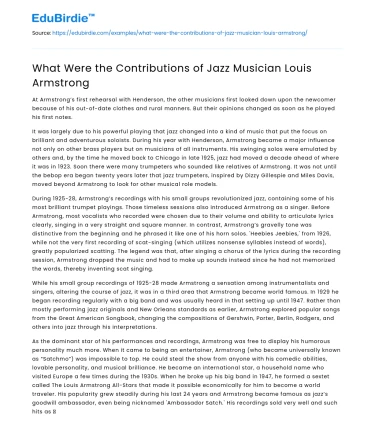At Armstrong’s first rehearsal with Henderson, the other musicians first looked down upon the newcomer because of his out-of-date clothes and rural manners. But their opinions changed as soon as he played his first notes.
It was largely due to his powerful playing that jazz changed into a kind of music that put the focus on brilliant and adventurous soloists. During his year with Henderson, Armstrong became a major influence not only on other brass players but on musicians of all instruments. His swinging solos were emulated by others and, by the time he moved back to Chicago in late 1925, jazz had moved a decade ahead of where it was in 1923. Soon there were many trumpeters who sounded like relatives of Armstrong. It was not until the bebop era began twenty years later that jazz trumpeters, inspired by Dizzy Gillespie and Miles Davis, moved beyond Armstrong to look for other musical role models.
Save your time!
We can take care of your essay
- Proper editing and formatting
- Free revision, title page, and bibliography
- Flexible prices and money-back guarantee
During 1925-28, Armstrong’s recordings with his small groups revolutionized jazz, containing some of his most brilliant trumpet playings. Those timeless sessions also introduced Armstrong as a singer. Before Armstrong, most vocalists who recorded were chosen due to their volume and ability to articulate lyrics clearly, singing in a very straight and square manner. In contrast, Armstrong’s gravelly tone was distinctive from the beginning and he phrased it like one of his horn solos. 'Heebies Jeebies,' from 1926, while not the very first recording of scat-singing (which utilizes nonsense syllables instead of words), greatly popularized scatting. The legend was that, after singing a chorus of the lyrics during the recording session, Armstrong dropped the music and had to make up sounds instead since he had not memorized the words, thereby inventing scat singing.
While his small group recordings of 1925-28 made Armstrong a sensation among instrumentalists and singers, altering the course of jazz, it was in a third area that Armstrong became world famous. In 1929 he began recording regularly with a big band and was usually heard in that setting up until 1947. Rather than mostly performing jazz originals and New Orleans standards as earlier, Armstrong explored popular songs from the Great American Songbook, changing the compositions of Gershwin, Porter, Berlin, Rodgers, and others into jazz through his interpretations.
As the dominant star of his performances and recordings, Armstrong was free to display his humorous personality much more. When it came to being an entertainer, Armstrong (who became universally known as “Satchmo”) was impossible to top. He could steal the show from anyone with his comedic abilities, lovable personality, and musical brilliance. He became an international star, a household name who visited Europe a few times during the 1930s. When he broke up his big band in 1947, he formed a sextet called The Louis Armstrong All-Stars that made it possible economically for him to become a world traveler. His popularity grew steadily during his last 24 years and Armstrong became famous as jazz’s goodwill ambassador, even being nicknamed 'Ambassador Satch.' His recordings sold very well and such hits as “Blueberry Hill,” “Mack The Knife” and 1964’s “Hello Dolly” kept him famous and busy.
As the most accessible of all jazz performers and a universally beloved figure, Armstrong introduced jazz to countless listeners while symbolizing the music for millions. His importance to jazz, whether through his solos, singing, or ability to win over listeners, cannot be measured. The history of jazz, American music, and music, in general, would be much different if there had not been Armstrong.






 Stuck on your essay?
Stuck on your essay?

